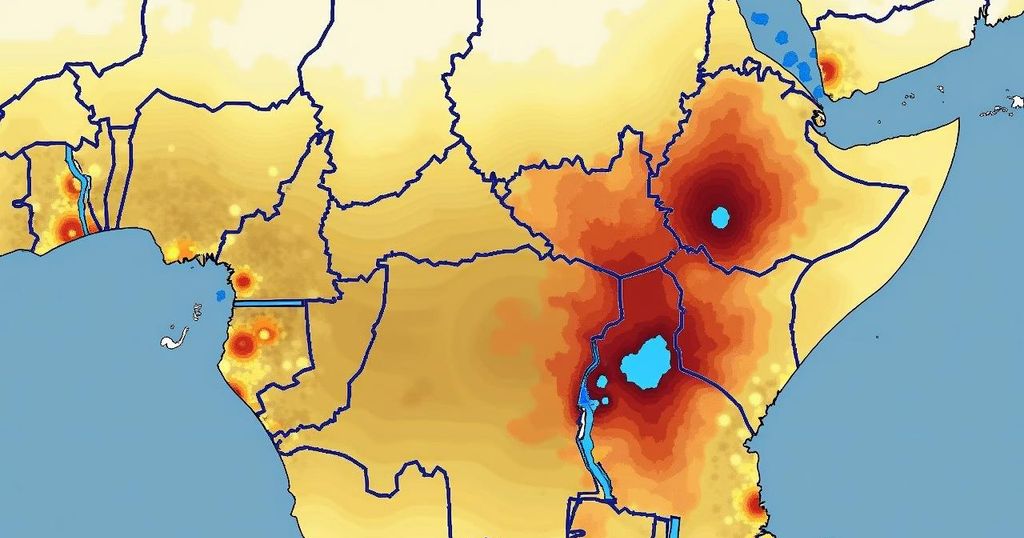The 2023/2024 El Niño event has caused severe drought across Southern Africa, marking it as the worst in 40 years. This climate disaster has precipitated massive food insecurity, with nearly 23 million people affected. Key impacts include diminished agricultural yields, limited water access, and exacerbated health crises, leading to urgent humanitarian needs. Displacement and disease outbreaks further complicate the already precarious situation, necessitating enhanced emergency response strategies in the affected nations.
The 2023/2024 El Niño phenomenon has induced severe drought conditions throughout Southern Africa, affecting nations such as Angola, Botswana, Lesotho, Malawi, Mozambique, Namibia, Zambia, and Zimbabwe. This El Niño event, reported as the most severe experienced in the last four decades, has led to an adversarial climate characterized by delayed rains, subsequent prolonged dry spells, and exceedingly high temperatures. Consequently, local communities are confronting alarming food shortages, limited access to potable water, livestock loss, and the outbreak of diseases. The drought has resulted in drastically below-average maize harvests across the region, as highlighted by national governmental assessments and those from FEWS NET (Famine Early Warning Systems Network). A grave situation is unfolding, with approximately 23 million individuals experiencing significant food insecurity, particularly in Malawi, Zambia, Zimbabwe, and Mozambique. Urgent humanitarian assistance is necessary for between 14.0 and 14.9 million individuals during the lean season, which spans from October to December 2024. National drought emergencies have been announced in six countries, with Angola and Mozambique also facing severe repercussions, including approximately 1.8 million food-insecure individuals in Angola and 3.3 million in Mozambique. The year 2024 also anticipates over two million children facing acute malnutrition, with over 500,000 experiencing severe cases of wasting. The intense weather challenges have precipitated mass displacements, exacerbated disease outbreaks, worsened food shortages, and intensified water scarcity, all while significantly affecting agricultural output. Compounding the crisis, the region is enduring one of its most significant cholera outbreaks in decades, jeopardizing hygiene and sanitation efforts as water shortages persist. Countries like Malawi and Mozambique remain at high risk for cholera resurgence. Moreover, the detrimental effects of drought may contribute to heightened risks of HIV/AIDS transmission, mental health concerns, and incidents of gender-based violence, prompting an urgent necessity for reinforced preparedness and responsive strategies. The combined challenges posed by El Niño, ongoing cholera outbreaks, regional conflicts, and the overarching threat of climate change have severely strained health systems across Southern Africa, disrupting critical access to essential and lifesaving sexual and reproductive health services. At present, more than one million individuals have been internally displaced in Malawi, Mozambique, and Zimbabwe due to these multifaceted crises.
The article discusses the major impact of the 2023/2024 El Niño event on Southern Africa, marking it as an unprecedented climate crisis that has led to significant drought conditions throughout the region. This crisis has exacerbated pre-existing vulnerabilities due to economic failures and environmental challenges. The drought’s severe outcomes include food insecurity, malnutrition, and disease outbreaks, which are intricately tied to the region’s historical experiences of climate events and public health challenges. With millions facing dire humanitarian situations, the article serves as a critical analysis of how concentrated environmental crises undermine not only food security but also public health and socio-economic stability.
In summary, the extreme drought resulting from the 2023/2024 El Niño event poses an urgent humanitarian crisis across Southern Africa, with millions experiencing acute food insecurity and malnutrition. The ramifications of this climatic phenomenon extend beyond immediate food shortages, disrupting essential health services and exacerbating public health challenges. As nations declare national drought emergencies and confront the prospect of disease outbreaks, there is a pressing need for coordinated response efforts to mitigate further human suffering, uphold food supplies, and safeguard community health amid ongoing environmental adversities.
Original Source: reliefweb.int






